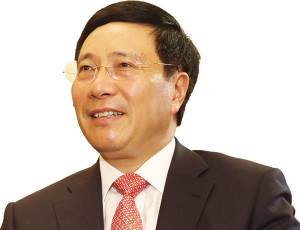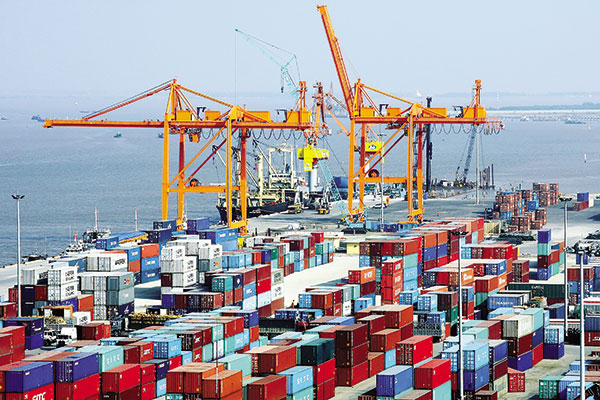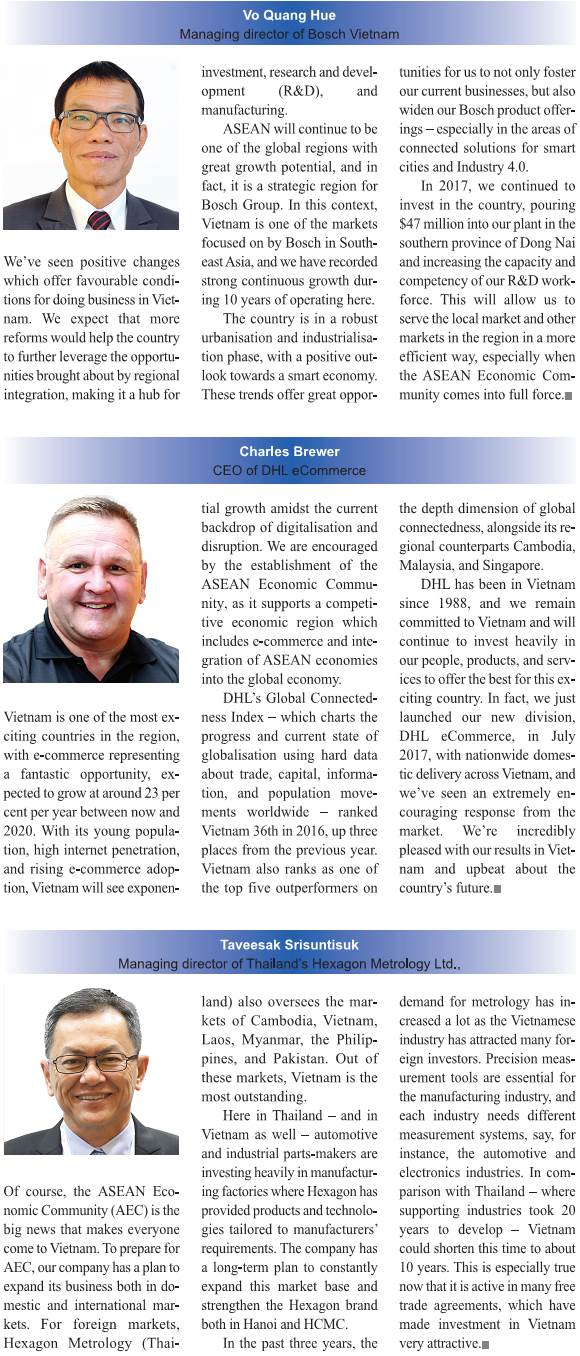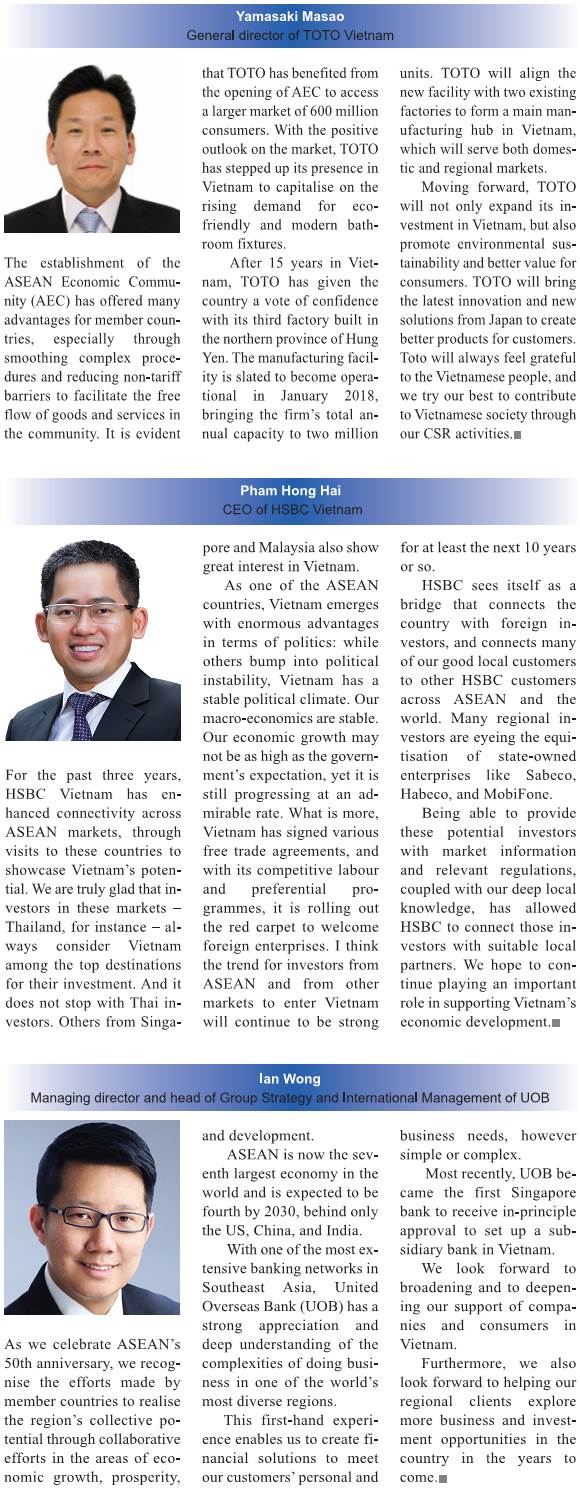ASEAN enters a new era, Vietnam staying in step
 |
Deputy Prime Minister and Minister of Foreign Affairs Pham Binh Minh talks VIR’s Thanh Tung about the positive effects that ASEAN membership has had on Vietnam in these years, and vice versa.
What impacts has the ASEAN Community had on Vietnam’s expanding trade and in attracting foreign direct investment (FDI)?
The ASEAN Economic Community (AEC), which is one of the ASEAN Community’s three major pillars, is the realisation of the end goal of regional economic integration of the 10 ASEAN economies. It facilitates the free flow of goods, capital, services, investment, and skilled labour.
AEC has created a single market home to a population of over 600 million people, with a GDP of about $3 trillion. ASEAN is now the world’s seventh-largest market. In terms of investment, Vietnam has received strong investments from ASEAN member states. This was seen not only after ASEAN became a community, but also before the community was born, thanks to the bloc’s agreements on fostering trade and investment.
Regarding trade, since the community was established, the trade volume among ASEAN member states has soared. But this has not been the case for Vietnam, which has seen its trade with other ASEAN markets reduced by 7-8 per cent.
This reflects the fact that Vietnam has yet to pay much attention to trading with these markets, and we must seriously consider this issue.
Do you think the main reason is that made-in-Vietnam goods are less competitive than those produced in other ASEAN markets?
Yes, there are many reasons, including the competitiveness of Vietnam’s goods. We should pay more attention to these markets, which have great potential, and also to improving the quality of our goods.
At a more macro angle, what is your comment on the role and contributions of Vietnam to ASEAN’s co-operation and development since its accession in July 1995?
Over the past 22 years, as a member state of ASEAN, Vietnam has been making positive and responsible contributions to the bloc’s development.
First, Vietnam contributed to the expansion of ASEAN, from a five-member bloc to its current 10 members.
Second, Vietnam also contributed to the official formation of the ASEAN Community on December 31, 2015. Though this community was established by the efforts and contributions of all the member states, Vietnam has had positive initiatives for the community, such as the Hanoi Action Plan, which is the first in a series of plans of action building up to the realisation of the goals of ASEAN’s broad vision for the year 2020. This sees ASEAN as a concert of Southeast Asian nations, outward looking, living in peace, stability, and prosperity, bonded together in a partnership for dynamic development and in a community of caring societies.
We have built up and implemented many goals for the ASEAN Community. So far, Vietnam is one of the pioneers in realising the community’s goals, with 95 per cent of the lines of actions having been successfully fulfilled by Vietnam.
Third, in the country’s role as a co-ordinator of co-operation mechanisms between ASEAN and its partners, such as China, the EU, and India, Vietnam has helped connect and expand relationships between ASEAN and these partners.
Fourth, Vietnam has taken the initiative to broaden the membership of the East Asia Summit (EAS) by boosting the admission of Russia and the US. In 2010, when it acted as ASEAN chair, Vietnam organised the ASEAN Defence Ministers’ Meeting Plus (ADMM+) for the first time.
These mechanisms are very important to connecting intra-ASEAN co-operation and co-operation between ASEAN and other nations. This has enhanced ASEAN’s position in the international arena.
Fifth, Vietnam twice acted as ASEAN chair in 1998 and 2010, helming many contributions and initiatives highly commended by its member states.
In addition, in response to ASEAN’s challenges, Vietnam has also made concrete contributions to the compilation of the Declaration on Conduct of the Parties in the South China Sea (DOC), in a bid to maintain peace and stability.
These are the important contributions of Vietnam as a responsible ASEAN member.
 |
| After 22 years of membership, Vietnam has taken its place as an indispensable member of the ASEAN Community, Photo: Le Toan |
What are you expecting from the future of ASEAN, with Vietnam’s ongoing contributions?
ASEAN has built up its vision until 2025, under which ASEAN’s goal is to continue to further cement its intra-political links, economic connectivity, and the sharing of social responsibilities.
This means that ASEAN takes people’s benefit as a base for its development policies, and takes the law as firm groundwork for its activities. ASEAN has its own charter, which will continue to serve as a firm foundation for its future activities.
One of the most important things is that in the future, Vietnam will, together with other member states, further cement the bloc’s solidarity. This is vital to ASEAN’s existence. If solidarity is maintained, ASEAN’s central role will continue.
Over the past 50 years of co-operation and development, the biggest successes of ASEAN have been to create its own prestige and position in the international arena, despite differing development levels and political systems among its members.
What about challenges for Vietnam, and ASEAN as a whole?
| As of July 20, 2017, Vietnam attracted 3,299 valid investment projects from ASEAN member states, registered at $65.35 billion and accounting for 21.34 per cent of the country’s total FDI, according to the Ministry of Planning and Investment. Vietnam witnessed a $3.7 billion trade deficit with ASEAN in the year’s first seven months. |
Over the past 50 years, ASEAN has been faced with numerous challenges. One of which is the different levels in economic development among the member states. Also, ASEAN is being faced with strategic competition from powerful countries. Besides, ASEAN has also had to cope with traditional challenges, and non-traditional challenges like terrorism.
Additionally, though the ASEAN Community has been established, the awareness about the community’s benefits of people and enterprises in general remains limited. Thus, all the member states including Vietnam must be responsible for raising their awareness about the benefits that the community has and will bring about, otherwise the community will be significant on paper only.
For example, when people well understand the benefits, they can enjoy convenient travel, exchange, and employment within the community, while enterprises can enjoy more tariff cuts and removal of trade barriers thanks to a shared production base created by the community.
ASEAN is strategically important to Vietnam, and is a priority in the foreign policy of our Party and state. A more people-oriented, closely-linked, affluent, and strong ASEAN, with greater solidarity, will contribute to ensuring the long-term benefit of all of its member states, and for the people in the region.
 |
 |
What the stars mean:
★ Poor ★ ★ Promising ★★★ Good ★★★★ Very good ★★★★★ Exceptional
Latest News
More News
- Russian President congratulates Vietnamese Party leader during phone talks (January 25, 2026 | 09:58)
- Worldwide congratulations underscore confidence in Vietnam’s 14th Party Congress (January 23, 2026 | 09:02)
- Political parties, organisations, int’l friends send congratulations to 14th National Party Congress (January 22, 2026 | 09:33)
- 14th National Party Congress: Japanese media highlight Vietnam’s growth targets (January 21, 2026 | 09:46)
- 14th National Party Congress: Driving force for Vietnam to continue renewal, innovation, breakthroughs (January 21, 2026 | 09:42)
- Vietnam remains spiritual support for progressive forces: Colombian party leader (January 21, 2026 | 08:00)
- Int'l media provides large coverage of 14th National Party Congress's first working day (January 20, 2026 | 09:09)
- Vietnamese firms win top honours at ASEAN Digital Awards (January 16, 2026 | 16:45)
- ASEAN Digital Ministers' Meeting opens in Hanoi (January 15, 2026 | 15:33)
- ASEAN economies move up the global chip value chain (December 09, 2025 | 13:32)
















 Mobile Version
Mobile Version